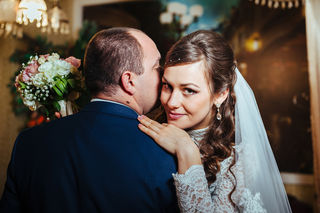Divorce
The Best (and Worst) Ages for Couples to Get Married
New findings confirm one part of the conventional wisdom, but upend the other.
Posted June 1, 2016 Reviewed by Lybi Ma
Key points
- Divorce is 50% less likely for someone who is 25 years old when they wed, compared to 20.
- A study reveals that getting married after one's mid-30s is actually riskier than getting married in one's late 20s.
- The best age at which to get married appears to be between 28 and 32, according to research.

Are you thinking about getting married? How can you know if your marriage will last? You could evaluate a long list of compatibility criteria—or you could just consider how old you are. Your age when you marry is surprisingly revealing of divorce vulnerability, although not in the way experts previously thought.
There’s a long-standing notion that people who marry later in life tend to have more stable marriages. Getting married as a teenager, according to this thinking, is the riskiest, and the most predictive of divorce. This makes sense, right? If you’re young, you’re probably financially strapped and uncertain about your professional future; you likely have age-related pressures from family, friends, work, and school. Heck, your brain isn’t even fully developed yet. On top of all this, many teenagers are inexperienced when comes to navigating relationship challenges. It’s just tough to get married when you’re very young.
Statistical trends do suggest that it's best to wait a few years: Divorce is 50% less likely for someone who is 25 years old when they wed, as compared to someone who gets married at age 20. Until now, this dramatic decrease has been seen as the beginning of a downward slope that keeps on decreasing, though at a somewhat slower rate, through our 20s, 30s, and beyond.
The idea that getting married older is less predictive of divorce also makes sense: It’s likely that couples are more financially stable, have a clearer sense of self and goals, and have spent enough time dating to know what they really want.
What’s happening now?
Sociological researcher Nicholas Wolfinger has discovered a startling new reality: His recent analysis of data from 2006 to 2010 in the National Survey of Family Growth (NSFG) reveals that getting married after your mid-30s is actually riskier than getting married in your late 20s—and that the best age at which to get married appears to be between 28 and 32. Before that age range, divorce rates are still decreasing; after that window, they begin to climb again.
Slate magazine calls these new findings the “Goldilocks theory of marriage.” Get married too early? Divorce rates are higher. Get married too late? You’re in a similar (if somewhat less dramatic) boat.
Why is this? Wolfinger can’t say for sure. But, as far as the pattern goes, he asserts that “its existence is beyond question.” When he replicated the finding using data from the 2011-2014 NSFG, the same trend emerged. After five years of marriage, couples who married as teens have a 38% risk of divorce; those in their early twenties are also highly vulnerable (27%), but then there’s a strong decline for couples who marry between ages of 25 and 29 (14%) and ages 30 to 34 (10%). Once again, though, couples who got married in their mid-30s saw an uptick in their divorce risk: Couples who wed for the first time at 35 or over had a 17% risk of divorce during their first five years of marriage.
Wolfinger controlled for a variety of demographic variables and still found evidence that in today’s world, marrying before your mid-20s or after your mid-30s is associated with higher rates of divorce. He speculates that self-selection is part of the explanation for this new reality: People who wait until their mid-30s to marry today generally aren't marrying for financial stability—which is usually established by early 30s—and might simply be less apt to succeed in marriage. And perhaps options like cohabitation without marriage are reducing the pool of marriage-eligible people over 30 who would succeed in committed relationships. Wolfinger's speculation is not without exception but may reflect a trend among individuals whose first marriages occur after 35.


